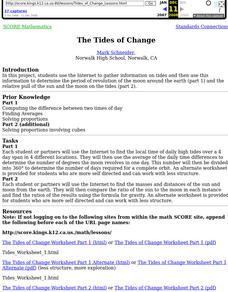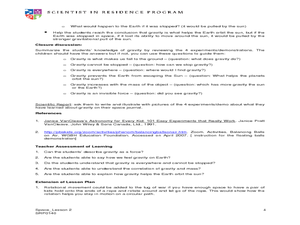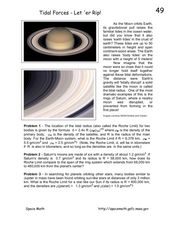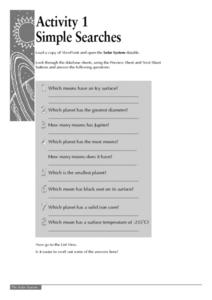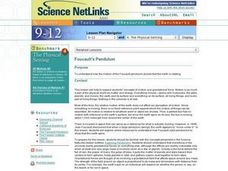Curated OER
Exploring the Night Sky: Fall/Winter
Pupils explain how moon phases occur. They explain three ways that the night sky has been used through history. Students locate some of the constellations in the night sky. They discuss stories and myths surrounding stars.
Curated OER
Let's Think About Day and Night
Students explore day and night and the relationships between the Earth, the sun and the moon. They discuss the ways in which the sun and moon help us. They watch a short video that helps illustrate these concepts.
Curated OER
Tides of Change
Students use the Internet to gather information on tides and then use this information to determine the period of revolution of the moon around the earth (part 1) and the relative pull of the sun and the moon on the tides (part 2).
Curated OER
Your Weight on Other Planets
Students explore their weight on other planets. In this science lesson, students view a presentation about the other planets and complete a worksheet in which they make predictions about their weight on the moon and other planets.
Curated OER
Solar System
Eighth graders identify the basic concepts of celestial bodies. They discover the difference between perihelion and aphelion and demonstrate how the universe is expanding. They also discover how gravity and centrifugal force are...
Curated OER
Newton's Laws
Students give examples of each of Newton's three laws as they occur in everyday experiences. They visually represent and differentiate the difference between a direct proportion and an inverse proportion. Students explain how the...
Curated OER
Astronomy
Students complete a unit of lessons on our solar system, its stars, and astronomers. They record information in a space journal, design constellations, define key vocabulary, observe the phases of the moon, and create a group planet...
Curated OER
Who Wants to be a Millionaire? Solar System
Fifteen questions about our solar system make up this interactive review game. It was written by a teacher in the UK, and therefore the monetary winnings for answering correctly are in pounds. The content applies, however, to any...
Curated OER
Newton's Universal Law of Gravitation with Simple Machines
First graders engage in a lesson that is about Newton's Laws Of Gravitation while conducting research in order to perform an information search. They sing a song about the Law of Gravitation and play a game of Ring Around The Rosie. Then...
Curated OER
Gravity Launch
Students use an online interactive to launch a rocket from earth. They have control over the angle and thrust of the rocket to discover the relationship between the two.
Curated OER
Water on Planetary Surfaces
In this water on planetary surfaces worksheet, students read about the Galileo spacecraft and the surface of Jupiter's moon Europa. They read about the energy needed to keep the water in a liquid state on Europa. Students solve 4...
Curated OER
Gravity - The Glue of the Universe
Learners explore physics by conducting a class experiment. In this gravitational force lesson plan, students define several scientific terms associated with force. Learners utilize a styrofoam cup and marbles to simulate a satellite...
Curated OER
Tidal Forces-Let'er Rip!
For this tidal forces worksheet, students read about the gravitational pull from the moon that causes the ocean tides. Students solve 3 problems including finding the Roche or the tidal radius for the Earth and Moon, comparing the Roche...
Curated OER
Newton's Second Law
In this Newton's second law worksheet, students read about force, mass and acceleration and how they relate. They solve eighteen problems using Newton's second law.
Curated OER
Weight A Minute
Students watch a video and engage in hands-on activities which introduce scientific information made real through re-cognition and understanding the phenomena of gravitational force and how it impacts life on our planet.
Curated OER
Simple Searches
For this space worksheet, students load a copy of ViewPoint and open the Solar System datafile. There they look through database sheets, using the Preview Sheet and Next Sheet buttons and respond to 8 questions. Then students do some...
Curated OER
Foucault's Pendulum
High schoolers investigate how the motion of the Foucault pendulum proves that the Earth is rotating. They research the Internet about pendulums and conduct an experiment online. They view a multimedia presentation about pendulums and...
Curated OER
Science
Learners study God's plan and how it works in the universe. This is a religious instructional activity where pupils divide into groups. Each person is assigned a job within the group, such as researcher, visual presenter, oral presenter,...
Curated OER
Magnetic Field and Electromagnetism
Here you will find a simple presentation on magnetic, gravitational, and electric fields. One of the two links to outside animations no longer is valid, and oneof the slides lists extension activities that are specific to a physics...
Curated OER
The Solar System and Beyond
What an inspiring PowerPoint! The color scheme and pictures all contribute to the scientific style of this PowerPoint and will keep the attention of your junior high kids. The diagrams help illustrate the positioning of the moon, sun and...
Lewiston High School
Weight and Mass & Forces in Equilibrium
I would weigh less on the moon? Send me there, then! On the top of the first page, a cartoon image demonstrates the difference between Earth and the moon. It then goes on to describe weight and mass and provides five practice problems...
Curated OER
Gravity
Sixth graders explore the characteristics of gravity. They discuss gravity on Earth and then use cereal boxes to research and compare the weight of objects on Earth to the weight of those objects on other planets.
Curated OER
Lesson-Mass and Weight
Student identify the three stationary positions, on the Earth, on the Moon, and in a house floating atop the cloud layers of Jupiter. They also identify the three orbiting positions, orbiting the Earth, orbiting the Moon, and orbiting...
Curated OER
Topsy Turvey Tides
Students explore ocean tides. They research how the sun, moon and earth affect the tides. Students draw a diagram illustrating low tides and high tides. They discuss the affect of gravitational pull on the oceans.




